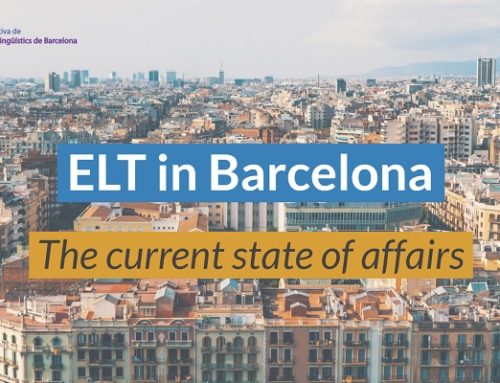SLB members Simon Courtney and Myles Klynhout collaborated to conduct a survey of how the COVID-19 crisis has impacted language teachers in the Barcelona area. Their survey shines light on a group of workers who have not suffered as badly as those in other sectors such as tourism and hostelry, but whose livelihoods have nevertheless been threatened. For a picture of pre-crisis conditions in the language teaching sector, please see our working conditions survey here.
COVID-19 needs no introduction. Its devastating effects on people and health systems around the world have dominated our screens and conversations for the past months. The only other thing that has managed to occupy newsreels besides the virus has been the economy. Much of the reporting has focused on national level stats of GDP and growth, fluctuations in abstract markets, or the impact on major sectors such as tourism and manufacturing.
We decided to take a closer look at how things played out for those in our sector, language education in Barcelona, Catalonia/Spain. More specifically, we wanted to see how the initial effects were felt for teachers on the ground in the weeks after the first State of Emergency (SoE) was officially declared on Friday 13th March, 2020.
We spoke with 100 teachers of Catalan, Spanish and English working in the Barcelona region, and this is what they told us.
1. Initial reactions from institutions
When it became apparent that COV-19 would disrupt classes, what was your institution’s response?
We asked teachers focused questions in order to get a snapshot of their working situations in the initial weeks of the countrywide lockdown. With the previous week filled with rumours and uncertainty, teaching institutions were suddenly closing their doors. What did this mean for teachers? Well, the results were quite mixed.
Just over a third of our respondents (34) were left in a precarious position:
- 19 had their classes cancelled and their salaries suspended temporarily
- 9 had their salaries cut
- 6 had their contracts terminated altogether
Meanwhile, 63 of the 100 teachers told us that they had a somewhat positive outcome, in the sense that there was no adjustment to contract conditions. 59 of these had their classes moved online with no adjustment to salray or working conditions other than the obvious one of working from home – however, some made comments about the extra hours of work required.
4 of the 63 had their classes were cancelled but they continued to receive their salaries. This may have been because their schools took advantage of a government scheme to pay workers’ salaries during temporary closures, although as we explain later, the survey was conducted when these plans were just being put in place.

But which institutions come out worse? Were people in a more precarious position depending on where they work?
We asked teachers which type of institutions they predominantly worked for, and unsurprisingly half (50) worked for private language academies onsite, with the rest being made up of freelancers (16), teachers giving classes in-company on behalf of academies (13), Universities (8), 3rd party intermediaries (7), and public institutions, i.e. state schools (6).

Below are the outcomes for teachers according to type of institution. Teachers working for academies and as freelancers were most likely to be affected, with 44% and 43% respectively reporting a negative outcome. The first of these will come as no surprise to teachers sadly accustomed to the precarious conditions in much of the circuit of language schools in the area. Admittedly, however, the picture with freelancers may not be clear as the survey questions were primarily designed for contracted workers. It is worth noting that only freelancers who lost 75% or more of their turnover during the lockdown could qualify for state aid.


There is also some probable crossover between teachers working in-house at academies and those sent to teach in-company, of whom 42% had a negative outcome. Those working for 3rd parties such as agencies were similarly affected.
One could put this down to many factors, but we suspect that the nature of the classes that these groups tend to give, travelling to offices or meeting students in public spaces such as cafes or libraries – all of which became immediately out of bounds – may have played a significant role. Also, businesses either closing down temporarily or starting to prioritise other matters must also have played its part, resulting in the cancelation of non-essential external services such as language classes.
We hope that the remainder of these teachers have been able to piece back together a workable timetable and transfer their classes online now that the dust has settled somewhat a few weeks on.


As might be expected, teachers at universities and state institutions registered the highest numbers in terms of positive results for their institutions’ initial reactions. On the other hand, and although the sample size was somewhat modest, it is perhaps a little on the surprising side that the remaining percentages (12.5% and 17% respectively) had both their classes and salaries suspended as a first reaction from their employers. This may be related to the more precarious ‘associate’ positions at public institutions.


Some comments from this section
No teachers laid off, same pay even though there are fewer hours.
I estimate that the team has now been reduced to 5. All the ‘part-time teachers’ have been fired. There are 5 teachers who now teach 100% online and have taken on more hours.
All teachers have been suspended and can now apply for government support.
I am getting paid for the same hours though working less (2 for every 3) so I think it’s likely if this situation carries on that they will reduce our weekly hours.
2. Worries for the following month
How concerned are you with regards to covering rent and basic expenses in April 2020?
When rumours fly around and employers are caught short, teachers, like all employees, start to get concerned about how they are going to pay rent and other basic utilities. We asked our respondents how concerned they were about covering basic expenses for the month of April following the first SoE.

38 participants told us they were either ‘very concerned’ or ‘concerned’ that they wouldn’t be able to cover the basics, with a further 20 saying they were ‘slightly concerned’. This equates to almost 60% of respondents sitting on the darker side of the spectrum.
A lot of these concerns were expressed as the government was laying out its strategy and started to step in for the private sector, where the former offered the latter the option to place employees on ERTE, an emergency scheme that pays employees for lost hours at a reduced rate of 70%. We sincerely hope that all teachers have been able to claim ERTE by the time of writing and can at least recoup some of the economic shortcomings caused by the virus.
Some comments from this section
I am very concerned with what will happen in May…I live on my own and have to pay €725 in rent, then there are bills and living costs.
The concern about getting paid…increases as students (or their parents) are fired from their jobs and quit the classes. If no students continue, the class is cancelled and you don’t get paid. This has started happening in April already, and will probably get worse.
They won’t give us an accurate answer as to what is going to happen with our April salaries.
My contract though is in jeopardy…I really need assistance and don’t know where to go exactly.
Next month I will not earn enough to cover social security.
3. Trust in employers
How much do you trust that your institution will support you during the coronavirus crisis?
Trust is a fickle beast to measure. We took the idea in the question above to either mean financial or practical support, or both. The importance of trust in times of crisis should not be underestimated; employees want to feel that those above them will support them in times like these, but as teachers we know that the roles often turn out to be the opposite and it is us who have to work longer, harder and smarter in order to keep things afloat. It was interesting to see that 47 of the teachers questioned in this survey said they had ‘little’, ‘very little’, or ‘no trust at all’ in the institutions that they were working for when disaster struck. The other side of the trust coin encouragingly showed that 28 teachers had ‘some’, ‘a lot’, or ‘total trust’ in their employers abilities and intentions to support them through the unknown. The remaining 22 hit the middle ground, which we could qualify as being ‘somewhat trusting’ of their institution.

Where trust lies was another enlightening aspect of this question; academy teachers registered just 30% on the more trusting side of the chart, compared to 66% for those working in public state institutions and 50% for university teachers. The flip side of these latter numbers, of course, shows that at least a third of teachers did not trust their institutions all that much.



Some comments from this section
We (6 teachers) have worked hard to move our classes online in less than one week.
My boss’ response was (despite schools and universities closed) ‘we’re open.
I trust my institution is doing everything in its power to support us.
0 support from employer regarding how to teach from home, platforms, contents, resources, but lots of demands.
The director/owner of my academy is putting all the responsibility of finding out how many students want to continue learning online and he is not participating in the decision making process at all. The academy has a very poor infrastructure, not to mention that they don’t want to buy a licence for any web-based platform that would allow us to teach the few lessons left with better quality.
For the first 2 weeks of lockdown we did all classes by email, this entailed more than double the normal workload.
I think my academy would support me if they could. It is however becoming clear that teachers are having their hours cut and many students are not showing up for their classes online.
I’m not a huge fan of my academy for other reasons, they are not best organized and while they say they have us covered during this situation, I’m covering my own back just in case.
I’ve been doing a course to train in how to teach online but still feel like I need more time. Currently everything is up in the air.
Concluding remarks
As stated at the beginning of this article, we asked 100 language teachers about their experience during the first few weeks of the epidemic. It is by no means wise to say that this is the state of affairs for the industry as a whole, but it has given us a small snapshot, and adds to the growing debate and conversation regarding precarity in the industry of language teaching.
The initial impact of the epidemic has been greatly felt by everyone, and as teachers we will be closely monitoring the constantly changing developments. There are concerns, not just for the months in lockdown, but in the months that follow the end of the academic year, and the knock-on effect for the start of the academic year in September. We hope for a return to some sort of normality by then. If this is nothing but wishful thinking, then we will continue to work together and collaborate with like-minded institutions to prepare for a changing world.
However, we expect employers to compensate workers for the extra work these changes often entail, and to provide their workers with the security they need and deserve. In too many cases this is clearly not happening.



